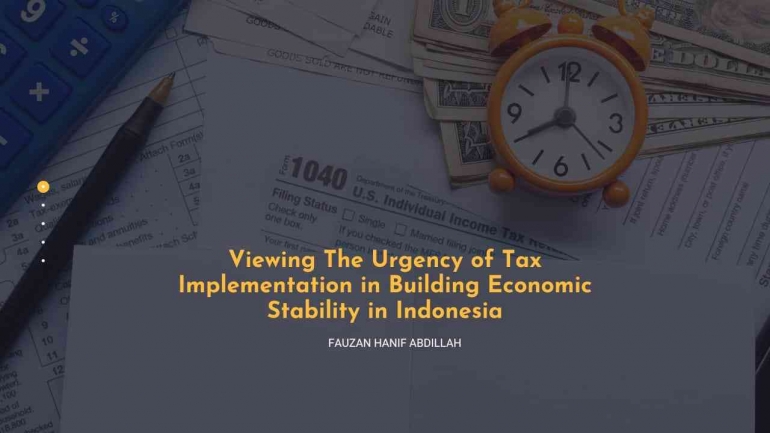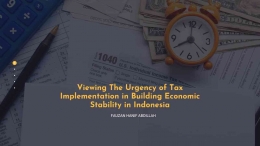(27/06/2023) - Fauzan Hanif Abdillah
As is known today, economic development is very much needed in carrying out interests in various aspects; economic growth can also produce an orderly life because of the fundamental role in the financial sector, which is used to meet the needs of society. In this case, economic development in its implementation requires regulatory provisions to optimize its role in economic development performance. One of the factors that can support the implementation of development is tax procurement. This happens because implementing tax procurement in economic growth is a method used to string together management and sources of income in economic development. The tax sector is also one factor determining the direction and objectives of implementing economic development.
In this regard, taxes function as a budget, which can be used as a source of funds to finance expenditures needed in economic development. The tax, the primary source of state revenue for development, is a sector that can be used to achieve financial stability through other benefits. With this in mind, tax management has a positive relationship with the implementation of national development because existing taxes are a mandatory contribution to the state, which has external benefits that benefit people's welfare, even for generations to come.
There are several regulations regarding tax procurement, one of which is contained in Law No. 16 of 2009 concerning General Provisions and Tax Procedures. Whereas in Article 1, which defines taxes, taxes are known as mandatory contributions to the state owed by individuals or entities that are coercive based on the law, by not receiving direct reciprocity and used for the needs of the state for the greatest prosperity of the people. Therefore, excellent and correct tax management is a comprehensive management that binds all aspects of state interests.
Tax Function and Implementation in National Development
In the existence of tax management provisions, the existing tax collection system functions as a regulator of the budget and stability in various fields of state administration, be it in the economic, social, political, cultural, defense, and security fields of the state. Taxes that aim to control state revenues in the financial sector are also related to price stability policies and state monetary inflation. In this case, tax procurement has a fundamental influence on the country's economy. This can be seen from the collection of taxes used to finance public interests, including levies on citizen income and the standard of living in society.
The role of taxes in the economic sector can open opportunities for the implementation of national development because the procurement of existing taxes, in its performance, can increase economic value, which is used as a resource in the implementation of national development. This is also found in research on the benefits of taxes in national development, such as Aqmarina & Furqon (2020), which reveals that one way to finance national development is through tax collection. So that in this case, tax procurement is access for the state to carry out economic goals, namely national development.
In line with this, the reality that occurs in the implementation of tax procurement is the use of taxes to finance the implementation of development because existing tax procurement is a source of state revenue and expenditure. With taxes as state income, the performance of tax collection becomes an obligation for citizens, which in this case, is a form of citizen participation in national development. While tax procurement is state expenditure, taxes that are known as a source of state revenue, in practice, are oriented toward financing national development. Therefore, the existence of tax collection is then a financing process that involves spending on national development.
The Effect of Tax Procurement on Economic Stability
As part of implementing national development, the economic sector is the main factor in determining the direction of national development. Tax procurement, which is part of the government's way of generating federal income sources, then creates tax procurement in its influence on economic stability. This happens because existing tax procurement contributes to implementing existing economic development goals in national development. The government, as a stakeholder, can then carry out the allocation of revenue and expenditure of tax funds in the implementation of existing products.











